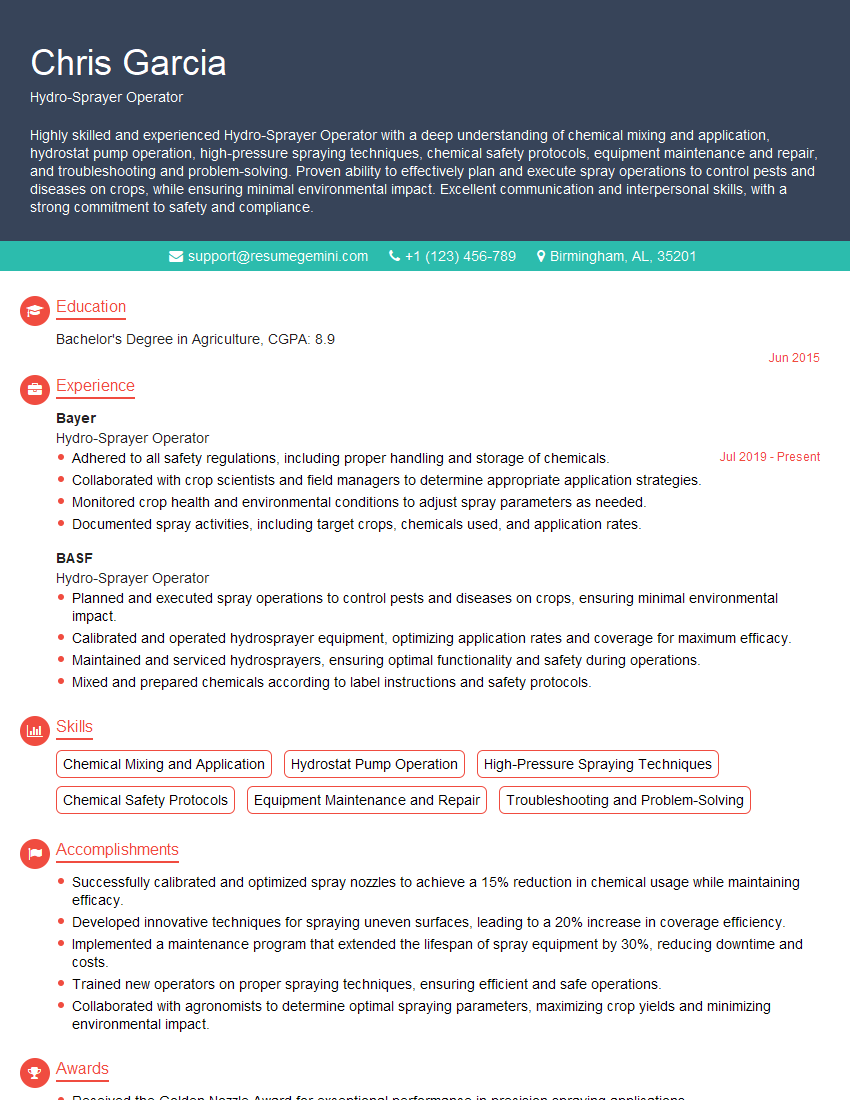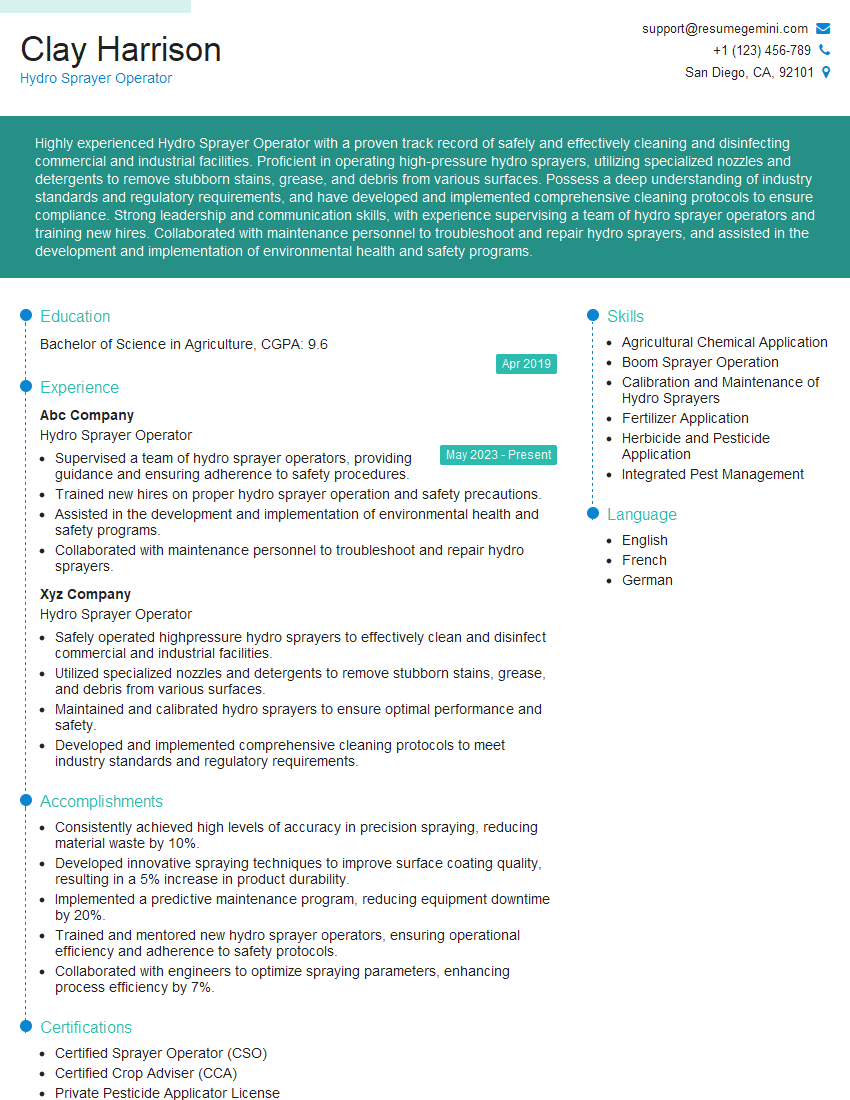Feeling lost in a sea of interview questions? Landed that dream interview for Hydro-Sprayer Operator but worried you might not have the answers? You’re not alone! This blog is your guide for interview success. We’ll break down the most common Hydro-Sprayer Operator interview questions, providing insightful answers and tips to leave a lasting impression. Plus, we’ll delve into the key responsibilities of this exciting role, so you can walk into your interview feeling confident and prepared.
Acing the interview is crucial, but landing one requires a compelling resume that gets you noticed. Crafting a professional document that highlights your skills and experience is the first step toward interview success. ResumeGemini can help you build a standout resume that gets you called in for that dream job.
Essential Interview Questions For Hydro-Sprayer Operator
1. Describe the key responsibilities of a Hydro-Sprayer Operator?
The key responsibilities of a Hydro-Sprayer Operator include:
- Operating and maintaining hydro-sprayer equipment to apply chemicals or other liquids to crops, trees, or other vegetation.
- Preparing and mixing chemicals and other liquids according to prescribed formulas.
- Calibrating and adjusting hydro-sprayer equipment to ensure proper application rates and coverage.
- Monitoring the application process to ensure that the desired results are achieved.
- Maintaining accurate records of chemicals and other liquids used, as well as the areas treated.
2. What are the different types of hydro-sprayer equipment and their applications?
- Hand-held hydro-sprayers: These are small, portable sprayers that are typically used for small-scale applications, such as spraying plants in a garden or greenhouse.
- Backpack hydro-sprayers: These are larger, backpack-mounted sprayers that are used for spraying larger areas, such as fields or orchards.
- Tractor-mounted hydro-sprayers: These are large, tractor-mounted sprayers that are used for spraying large areas, such as farms or forests.
- Air-blast sprayers: These are specialized sprayers that use a powerful air stream to carry the spray droplets to the target area. They are often used for spraying trees or other tall vegetation.
3. What are the safety precautions that must be taken when operating a hydro-sprayer?
The safety precautions that must be taken when operating a hydro-sprayer include:
- Wearing appropriate personal protective equipment (PPE), such as gloves, goggles, and a respirator.
- Reading and understanding the manufacturer’s instructions for the hydro-sprayer.
- Mixing and applying chemicals according to the manufacturer’s instructions.
- Never spraying chemicals into the wind.
- Storing chemicals in a safe and secure location.
- Disposing of empty chemical containers properly.
4. How do you calibrate a hydro-sprayer to ensure accurate application rates?
To calibrate a hydro-sprayer to ensure accurate application rates, the following steps should be taken:
- Determine the desired application rate.
- Fill the hydro-sprayer with water.
- Spray the water over a known area.
- Measure the amount of water that was sprayed.
- Adjust the hydro-sprayer settings until the desired application rate is achieved.
5. What are the common problems that can occur with hydro-sprayers and how do you troubleshoot them?
- Clogged nozzles: This can be caused by a variety of factors, such as dirt, debris, or chemical buildup. To troubleshoot, remove the nozzle and clean it with a soft brush or compressed air.
- Leaking hoses: This can be caused by wear and tear, or by damage to the hose. To troubleshoot, inspect the hose for damage and replace it if necessary.
- Pump problems: This can be caused by a variety of factors, such as a worn-out pump or a lack of lubrication. To troubleshoot, check the pump for wear and tear and lubricate it if necessary.
6. What are the different types of chemicals that can be applied with a hydro-sprayer?
- Herbicides: These chemicals are used to kill weeds.
- Pesticides: These chemicals are used to kill insects and other pests.
- Fungicides: These chemicals are used to kill fungi.
- Fertilizers: These chemicals are used to provide nutrients to plants.
7. What are the environmental and health risks associated with the use of hydro-sprayers?
The environmental and health risks associated with the use of hydro-sprayers include:
- Water pollution:Chemicals applied with hydro-sprayers can run off into water sources and contaminate them.
- Air pollution:Chemicals applied with hydro-sprayers can volatilize into the air and contribute to air pollution.
- Soil contamination:Chemicals applied with hydro-sprayers can accumulate in the soil and contaminate it.
- Human health risks:Chemicals applied with hydro-sprayers can be toxic to humans if they are inhaled, ingested, or absorbed through the skin.
8. What are the best practices for reducing the environmental and health risks associated with the use of hydro-sprayers?
The best practices for reducing the environmental and health risks associated with the use of hydro-sprayers include:
- Using only the amount of chemicals that is necessary.
- Applying chemicals only when the weather conditions are favorable.
- Using a hydro-sprayer that is in good condition and is properly calibrated.
- Wearing appropriate personal protective equipment (PPE).
- Disposing of empty chemical containers properly.
9. What are the career opportunities for Hydro-Sprayer Operators?
Hydro-Sprayer Operators can advance their careers by becoming:
- Pest Control Technician: Pest Control Technicians apply pesticides and other chemicals to control pests in homes, businesses, and other buildings.
- Agricultural Technician: Agricultural Technicians work with farmers and ranchers to improve crop production and livestock management.
- Horticulturalist: Horticulturists grow and maintain plants for a variety of purposes, including food, medicine, and landscaping.
10. What are the key skills and qualities that make a successful Hydro-Sprayer Operator?
The key skills and qualities that make a successful Hydro-Sprayer Operator include:
- Attention to detail: Hydro-Sprayer Operators must be able to pay close attention to detail in order to ensure that chemicals are applied accurately and safely.
- Physical fitness: Hydro-Sprayer Operators must be able to lift heavy equipment and work in all types of weather conditions.
- Problem-solving skills: Hydro-Sprayer Operators must be able to troubleshoot problems with equipment and chemicals.
- Communication skills: Hydro-Sprayer Operators must be able to communicate effectively with supervisors, co-workers, and customers.
Interviewers often ask about specific skills and experiences. With ResumeGemini‘s customizable templates, you can tailor your resume to showcase the skills most relevant to the position, making a powerful first impression. Also check out Resume Template specially tailored for Hydro-Sprayer Operator.
Career Expert Tips:
- Ace those interviews! Prepare effectively by reviewing the Top 50 Most Common Interview Questions on ResumeGemini.
- Navigate your job search with confidence! Explore a wide range of Career Tips on ResumeGemini. Learn about common challenges and recommendations to overcome them.
- Craft the perfect resume! Master the Art of Resume Writing with ResumeGemini’s guide. Showcase your unique qualifications and achievements effectively.
- Great Savings With New Year Deals and Discounts! In 2025, boost your job search and build your dream resume with ResumeGemini’s ATS optimized templates.
Researching the company and tailoring your answers is essential. Once you have a clear understanding of the Hydro-Sprayer Operator‘s requirements, you can use ResumeGemini to adjust your resume to perfectly match the job description.
Key Job Responsibilities
Hydro-Sprayer Operators are responsible for operating heavy-duty spraying equipment to apply protective coatings and other materials to various surfaces, including buildings, bridges, tanks, and pipelines.
1. Equipment Operation
Operate and maintain hydro-spraying equipment, including air compressors, pumps, hoses, and spray guns.
- Adjust equipment settings to ensure proper application of materials.
- Monitor equipment performance and troubleshoot any issues.
2. Material Application
Apply protective coatings, sealants, and other materials to surfaces according to specified requirements.
- Prepare surfaces for application by cleaning, sanding, or priming.
- Select appropriate materials and mix them to achieve desired results.
3. Safety and Maintenance
Follow proper safety protocols while operating equipment and handling materials.
- Maintain a clean and organized work area.
- Inspect equipment regularly and perform necessary maintenance tasks.
4. Communication and Teamwork
Communicate effectively with supervisors, engineers, and other team members.
- Receive and follow instructions accurately.
- Provide feedback on material performance and equipment issues.
Interview Tips
To prepare for a Hydro-Sprayer Operator interview, consider the following tips:
1. Research the Company and Industry
Learn about the company’s operations, values, and industry trends. This demonstrates your interest and understanding of the role.
- Visit the company’s website and social media pages.
- Read trade publications and industry news.
2. Highlight Relevant Skills and Experience
Emphasize your experience with hydro-spraying equipment, material application, and safety procedures.
- Quantify your accomplishments, using specific numbers and metrics.
- Provide examples of your ability to operate equipment effectively and troubleshoot issues.
3. Prepare for Common Interview Questions
Anticipate common interview questions and practice your responses. Consider the following examples:
- Tell me about your experience with hydro-spraying equipment.
- How do you ensure the proper application of protective coatings?
- What safety measures do you follow while operating hydro-spraying equipment?
- How do you handle unforeseen challenges on the job?
- Why are you interested in working for our company?
4. Ask Informed Questions
Asking thoughtful questions shows your engagement and interest in the role. Consider asking about:
- The company’s current projects and upcoming opportunities.
- Training and professional development opportunities.
- The company’s safety and environmental policies.
- The work environment and team culture.
5. Dress Professionally and Arrive on Time
Make a positive first impression by dressing appropriately and arriving for your interview on time.
- Wear clean and ironed business attire.
- Be punctual and respectful of the interviewer’s time.
Next Step:
Armed with this knowledge, you’re now well-equipped to tackle the Hydro-Sprayer Operator interview with confidence. Remember, a well-crafted resume is your first impression. Take the time to tailor your resume to highlight your relevant skills and experiences. And don’t forget to practice your answers to common interview questions. With a little preparation, you’ll be on your way to landing your dream job. So what are you waiting for? Start building your resume and start applying! Build an amazing resume with ResumeGemini.

